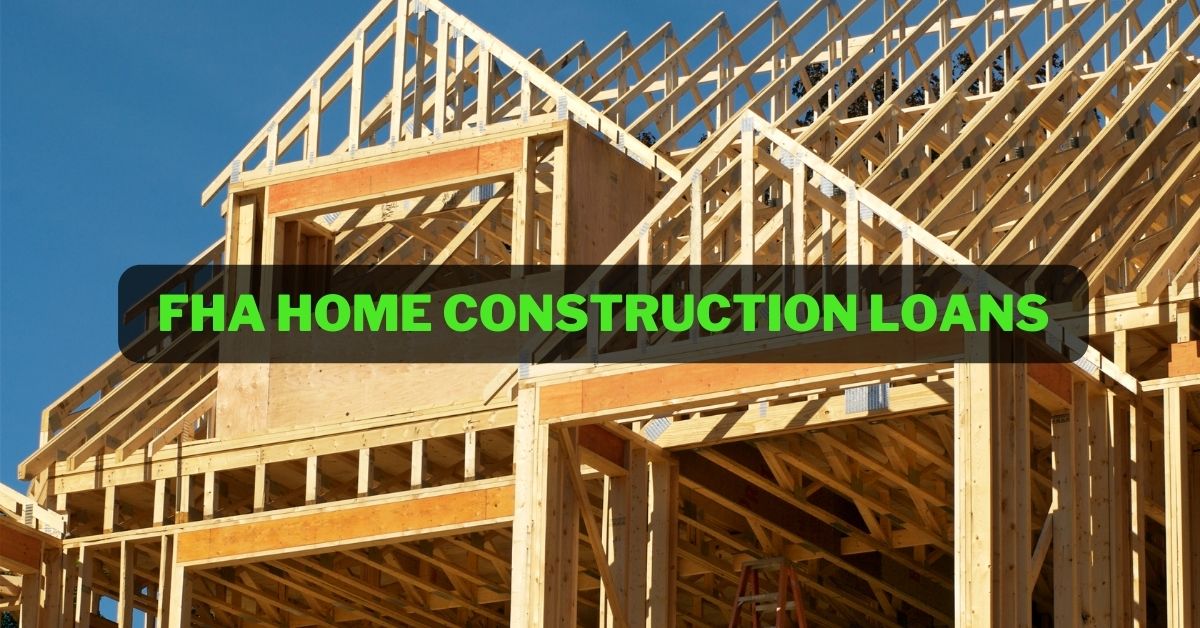
The Ultimate Guide to FHA Home Construction Loans: Everything You Need to Know
Building your dream home is an exciting journey, but the financial aspect can often be worrisome. That’s where FHA home construction loans come into play. In this comprehensive guide, we will walk you through everything you need to know about FHA home construction loans, so you can make informed decisions and turn your dream into a reality.
Whether you’re looking to build a new home from scratch or renovate an existing property, FHA home construction loans offer a flexible and affordable option. With their low down payment requirements, lenient credit guidelines, and competitive interest rates, these loans are designed to make homeownership accessible to more people.
From understanding the eligibility criteria to navigating the construction process, we will cover it all. We’ll delve into the benefits and drawbacks of FHA home construction loans, explain the different loan types available, and provide a step-by-step guide to help you secure financing for your project.
So, if you’re ready to embark on your home construction journey, let’s dive in and explore the world of FHA home construction loans together.
Benefits of FHA home construction loans
FHA home construction loans are a type of mortgage financing that allows borrowers to build a new home or make significant renovations to an existing property. These loans are insured by the Federal Housing Administration (FHA), which makes them less risky for lenders and more accessible for borrowers.
One of the key benefits of FHA home construction loans is their low down payment requirement. Unlike conventional construction loans that typically require a down payment of 20% or more, FHA loans only require a down payment as low as 3.5% of the total project cost. This makes it easier for borrowers to get started on their construction projects without having to save up a large sum of money upfront.
Another advantage of FHA home construction loans is the lenient credit guidelines. While traditional lenders may have strict credit score requirements, FHA loans are more forgiving and often accept borrowers with lower credit scores. This opens up opportunities for individuals who may not qualify for conventional construction loans but still want to build their dream home.
In addition to the low down payment and lenient credit requirements, FHA home construction loans also offer competitive interest rates. This can save borrowers thousands of dollars over the life of their loan, making homeownership more affordable in the long run.
The FHA home construction loan process
Before you can apply for an FHA home construction loan, you need to meet certain eligibility requirements. Here are the key criteria you need to fulfill:
- Credit score: While FHA loans have more lenient credit requirements compared to conventional loans, you still need to have a minimum credit score of 580 to qualify for the low down payment option. If your credit score is below 580, you may still be eligible, but you’ll need to make a larger down payment of at least 10%.
- Debt-to-income ratio: Lenders also consider your debt-to-income ratio when evaluating your eligibility for an FHA loan. This ratio compares your monthly debt payments to your gross monthly income. Ideally, your debt-to-income ratio should be no higher than 43% to qualify for an FHA loan.
- Employment history: You need to have a stable employment history, preferably with at least two years of continuous employment in the same field. Lenders want to see that you have a reliable source of income to make your monthly mortgage payments.
- Proof of income: Lenders will require documents such as pay stubs, W-2 forms, and tax returns to verify your income. This helps them determine your ability to repay the loan.
- Property requirements: The property you intend to build or renovate must meet certain requirements set by the FHA. This includes adhering to local building codes, having adequate water and sewage systems, and being in a habitable condition.
By meeting these eligibility requirements, you can increase your chances of securing an FHA home construction loan. It’s important to note that these requirements may vary slightly depending on the lender, so it’s always a good idea to check with multiple lenders to find the best fit for your needs.

Understanding the different types of FHA home construction loans
Securing an FHA home construction loan involves several steps. Here’s a breakdown of the process:
- Preparation: Before you start looking for a lender, it’s important to determine your budget and identify the type of home you want to build or renovate. This includes deciding on the size, location, and amenities of your future home.
- Finding a lender: Once you have a clear idea of your project’s scope, it’s time to find a lender who offers FHA home construction loans. Research different lenders, compare interest rates and terms, and choose the one that best fits your needs.
- Pre-approval: Before you can start the construction process, you need to get pre-approved for an FHA loan. This involves submitting your financial documents to the lender, who will evaluate your eligibility based on your credit score, debt-to-income ratio, and other factors.
- Choosing a contractor: If you’re building a new home, you’ll need to find a licensed contractor who will oversee the construction process. Make sure to choose a contractor with experience in FHA home construction loans, as they will be familiar with the specific requirements.
- Loan application: Once you have your pre-approval, you can officially apply for the FHA home construction loan. This involves filling out the necessary paperwork, providing additional documentation, and paying any associated fees.
- Underwriting and approval: After you submit your loan application, the lender will review your documents, verify your information, and assess the property’s value. This process is known as underwriting. If everything checks out, you will receive final approval for the loan.
- Closing and construction: Once your loan is approved, you will proceed to the closing stage. This involves signing the necessary paperwork and transferring ownership of the property. After closing, the construction can begin, and the lender will release funds to the contractor as needed.
- Inspections and draws: Throughout the construction process, the lender will conduct inspections to ensure that the work is progressing according to plan. They will release funds to the contractor in installments, known as draws, based on the completion of specific milestones.
- Completion and occupancy: Once the construction is complete, the lender will conduct a final inspection to ensure that the property meets all FHA standards. If everything checks out, you can move into your newly constructed or renovated home.
By understanding the step-by-step process of securing an FHA home construction loan, you can navigate the financing process with confidence and clarity.
Pros and cons of FHA home construction loans
FHA home construction loans come in different forms, each designed to meet specific needs and circumstances. Here are the main types of FHA home construction loans:
- One-time close construction loan: This type of loan is ideal for borrowers who want to build a new home from scratch. With a one-time close construction loan, you can finance both the purchase of the land and the construction costs in a single loan. This streamlines the financing process and eliminates the need for separate loans.
- Renovation loan: If you’re planning to renovate an existing property, a renovation loan can help cover the costs. These loans allow you to finance both the purchase of the property and the renovation expenses in a single loan. Renovation loans are a great option for borrowers who want to turn a fixer-upper into their dream home.
- 203(k) loan: The FHA 203(k) loan program is specifically designed for homebuyers who want to purchase a property that needs significant repairs or renovations. This loan allows you to roll the purchase price and renovation costs into a single mortgage. The 203(k) loan program offers two options: the Standard 203(k) and the Limited 203(k), depending on the extent of the renovations required.
Understanding the different types of FHA home construction loans will help you determine which option is best suited for your specific needs and goals. Consult with your lender to explore the available options and choose the one that aligns with your project.

How to find a lender for FHA home construction loans
As with any type of financing, FHA home construction loans have their advantages and disadvantages. Here’s a breakdown of the pros and cons:
Pros:
- Low down payment: FHA loans offer a low down payment requirement, making it easier for borrowers to get started on their construction projects without having to save up a large sum of money upfront.
- Lenient credit guidelines: FHA loans are more forgiving when it comes to credit scores, giving borrowers with lower credit scores the opportunity to qualify for financing.
- Competitive interest rates: FHA home construction loans offer competitive interest rates, which can save borrowers thousands of dollars over the life of their loan.
- Flexibility: FHA loans allow borrowers to finance both the purchase of the land and the construction costs, streamlining the financing process.
- Government-backed insurance: FHA loans are insured by the Federal Housing Administration, reducing the risk for lenders and making it easier for borrowers to secure financing.
Cons:
- Mortgage insurance: FHA loans require borrowers to pay mortgage insurance premiums, which can increase the overall cost of the loan.
- Property requirements: The property you intend to build or renovate must meet certain requirements set by the FHA, which may limit your options.
- Loan limits: FHA loans have maximum loan limits, which may restrict the size and scope of your construction project.
- Additional fees: FHA loans may come with additional fees, such as upfront mortgage insurance premiums and annual mortgage insurance premiums.
While FHA home construction loans offer numerous advantages, it’s important to weigh the pros and cons to determine if they are the right fit for your specific situation. Consulting with a knowledgeable lender can help you make an informed decision.
Tips for successfully applying for an FHA home construction loan
Finding the right lender for your FHA home construction loan is crucial to the success of your project. Here are some tips to help you find a lender that meets your needs:
- Research online: Start by researching lenders online and reading reviews from other borrowers. Look for lenders that specialize in FHA home construction loans and have a solid reputation.
- Get recommendations: Reach out to friends, family, or colleagues who have recently gone through the home construction process and ask for recommendations. Personal referrals can provide valuable insights and help you find reputable lenders.
- Contact local banks and credit unions: Visit local banks and credit unions in your area and inquire about their FHA home construction loan programs. They may have competitive rates and personalized service.
- Attend home construction events: Attend home construction events in your community, such as trade shows or seminars. These events often attract lenders who specialize in construction financing.
- Consult with a mortgage broker: Consider working with a mortgage broker who has experience with FHA home construction loans. They can help you navigate the lending landscape and find the best options for your project.
Remember to compare interest rates, loan terms, and fees from multiple lenders to ensure you’re getting the best deal. Take the time to ask questions and gather all the necessary information before making a decision.
Common misconceptions about FHA home construction loans
Applying for an FHA home construction loan can be a complex process, but with these tips, you can increase your chances of success:
- Improve your credit score: Before applying for an FHA loan, take steps to improve your credit score. Pay off outstanding debts, make all payments on time, and avoid taking on new credit.
- Save for a larger down payment: While FHA loans require a low down payment, saving for a larger down payment can help you qualify for better loan terms and reduce the overall cost of the loan.
- Organize your financial documents: Gather all the necessary financial documents, including pay stubs, W-2 forms, tax returns, bank statements, and any other documentation that proves your income and assets.
- Shop around for the best rates: Don’t settle for the first lender you come across. Shop around and compare rates and terms from multiple lenders to ensure you’re getting the best deal.
- Work with experienced professionals: Hire a licensed contractor who has experience with FHA home construction loans. They will be familiar with the specific requirements and can help ensure a smooth construction process.
- Stay organized: Keep all your loan documents and records in one place to easily track your progress and stay on top of deadlines.
By following these tips, you can increase your chances of a successful loan application and a smooth home construction process.
Conclusion: Is an FHA home construction loan right for you?
